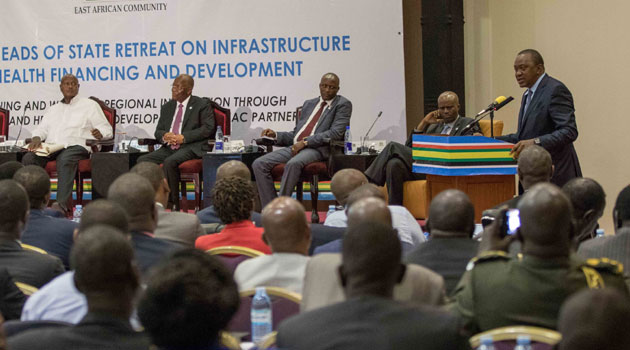The East African Community (EAC) needs $78b (about Shs282 trillion) in the next 10 years to fund more than 200 infrastructure projects in the five-member states.
Under the projects, the key ones including the Standard Gauge Railway, hydropower, oil and gas projects across the region, are to cost $62.2b (about Shs224 trillion). Leaders from Uganda, Tanzania, Kenya, Rwanda, Burundi and South Sudan, who met yesterday in Kampala, said the revenue will be internally and externally raised through borrowing and also Public Private Partnership (PPP).
However, the leaders disagreed on which projects the PPP model should be used for.
Ugandan President, Yoweri Museveni, said the PPP model was not working well because private investors were borrowing expensive capital to invest in infrastructure projects such as hydropower generation, which in the end burdens consumers.
“PPP is good, but we need to agree on how it should be used and in which areas. It can help build infrastructure, but for crucial ones like electricity, railway and laying of internet cables, we’ve to be careful. We cannot afford high costs of electricity,” he said.
He cited the Bujagali hydro-power project that is run on a PPP model as an expensive partnership for both government and industries.
“We had agreed with an American company to produce per unit cost at four American cents, but my people went and signed with another company at 11 cents,” he continued.
President Uhuru Kenyatta had earlier said he was a strong believer in the PPP model. “I am a strong believer in PPP. But I have a problem of bureaucracy in government which frustrates our development partners,” he said.
Rwanda’s Minister for Infrastructure who represented President Paul Kagame also said the PPP model was working well in his country.“We have had good experiences in Rwanda,” told the leaders.
Tanzania President John Magufuli said EAC was focusing more on building infrastructure but not building production capacity of the people.
On his part, South Sudan President Salva Kiir chided the American government for slapping arms embargo on his country. “As we were trying to implement the 2015 peace agreement, we were surprised by the sanctions announced by the American President. How do you slap arms embargo on us when the people we’re talking to are getting arms?
South Sudan, whose status to get full admission into EAC will be discussed today during the Heads of State Summit, has experienced war since 2013. Mr Kiir asked EAC to support South Sudan to end the spiral of violence. “We want you to stand with us and end the war so that we develop the natural resources we have,” he said.
The leaders also listed nine health priority areas that the Community should prioritise in the next 10 years.
Among those are increasing safe and affordable health care, establishing a strong primary health care systems, establishment of insurance coverage in all partner states, and increase domestic financing to the health sectors.


